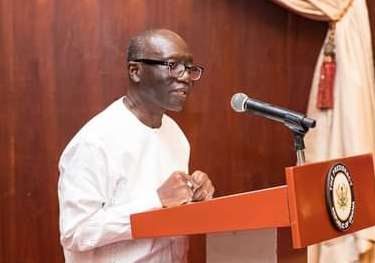The Finance Minister of Ghana, Mr. Ken Ofori-Atta has disclosed that a key challenge with Credit Rating Agencies (CRAs) is the “systemic bias” in their rating methodologies, procedures, practices, and processes towards Africa.
Speaking as a panelist on the margins of the 2023 World Bank/IMF Annual Spring Meetings in Washington DC, on the theme ‘The impact of credit ratings on the costs of development finance in Africa’, Mr. Ken Ofori-Atta averred that there is a consistently unfavourable credit ratings and negative outlook projections from agencies to potentially impede Africa’s growth and negatively undermine their ability.
“So today with this poorly crisis, the pertinent question is how will Africa mobilise our resources required when we are essentially written off as markets that are riskier?”
Mr. Ken Ofori Atta
The finance minister said the unfair ratings affected developing countries’ access to credit, adding that: “ The whole system is geared towards making the use of our resources difficult to justify.”
Since 2003 to date, Mr. Ofori-Atta has kept saying that Ghana had and has three upgrades and nine downgrades, and though between 2017 and 2019 the country had successive rating upgrades with a “track-record” of safeguarding macroeconomic stability, it was questionable that the country was downgraded during a pandemic.
“Unless we prioritize reform now, the divergence between developed and developing nations will become a toxic recipe for instability, crisis, and forced migration.”
Mr. Ken Ofori Atta
For him, the continent remains poor due to factors such as illicit financial flows, surcharges being paid to multilaterals and reckons the African Union can do more to support African economies to stand on its feet with policies.
More so, United Nations Development Programme (UNDP) report notes that the combined cost of credit ratings issues has cost Africa around $75b, money that could have been used for 80% of Africa’s annual infrastructure investment needs.
The role of credit rating agencies is critical in determining sovereign creditworthiness and, consequently, the cost of debt for both sovereign and corporate borrowers.
Fitch Downgrades
It can be recalled that rating agency, fitch, downgraded Ghana’s Long-Term Foreign-Currency (LTFC) Issuer Default Rating (IDR) to ‘RD’ (Restricted Default) from ‘C’ after the country missed the grace period to make a coupon payment ($40.6 million) on one of its Eurobonds.

Fitch also downgraded the rating of the country’s $1 billion Eurobond maturing on January 18, 2026 to ‘D’ from ‘C’ and withdrawn its rating.
It affirmed all the long-term senior unsecured foreign-currency-denominated issue ratings at ‘C’ and withdrawn their ratings.
It also affirmed the partially-guaranteed $1 billion notes maturing in 2030 at ‘CC’.
Not limited to that, Fitch also projected Ghana’s banking sector loans to fall considerably in 2023, whilst deposit growth decline marginally.
It said Ghana’s client loan growth will ease from 30.2% year-on-year in 2022 to 18.0% in 2023.
However, it added that growth in deposits will be held back by the worsening economic environment, as locals will likely have to tap into their savings to compensate for the loss in income.
Read also: Ghana To Receive Financial Assurances From Official Creditor Committee By April 2023



















